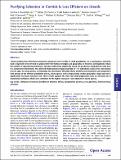Files in this item
Purifying selection in corvids is less efficient on islands
Item metadata
| dc.contributor.author | Kutschera, Verena E. | |
| dc.contributor.author | Poelstra, Jelmer W. | |
| dc.contributor.author | Botero-Castro, Fidel | |
| dc.contributor.author | Dussex, Nicolas | |
| dc.contributor.author | Gemmell, Neil J. | |
| dc.contributor.author | Hunt, Gavin R. | |
| dc.contributor.author | Ritchie, Michael G. | |
| dc.contributor.author | Rutz, Christian | |
| dc.contributor.author | Wiberg, R. Axel W. | |
| dc.contributor.author | Wolf, Jochen B.W. | |
| dc.date.accessioned | 2020-02-14T11:30:13Z | |
| dc.date.available | 2020-02-14T11:30:13Z | |
| dc.date.issued | 2020-02 | |
| dc.identifier | 266390213 | |
| dc.identifier | 8ba6c010-0750-4c2e-a550-cb525b8a3e9c | |
| dc.identifier | 85078869460 | |
| dc.identifier | 31633794 | |
| dc.identifier | 000518533800014 | |
| dc.identifier.citation | Kutschera , V E , Poelstra , J W , Botero-Castro , F , Dussex , N , Gemmell , N J , Hunt , G R , Ritchie , M G , Rutz , C , Wiberg , R A W & Wolf , J B W 2020 , ' Purifying selection in corvids is less efficient on islands ' , Molecular Biology and Evolution , vol. 37 , no. 2 , pp. 469-474 . https://doi.org/10.1093/molbev/msz233 | en |
| dc.identifier.issn | 0737-4038 | |
| dc.identifier.other | ORCID: /0000-0001-7913-8675/work/69029136 | |
| dc.identifier.other | ORCID: /0000-0001-5187-7417/work/69029264 | |
| dc.identifier.uri | https://hdl.handle.net/10023/19463 | |
| dc.description | Funding was provided by the European Research Council (ERCStG-336536 FuncSpecGen to J.B.W.W.), the Swedish Research Council Vetenskapsrådet (621-2013-4510 to J.B.W.W.), the Knut and Alice Wallenberg Foundation (to J.B.W.W.), the Lawski foundation (to V.E.K. and J.B.W.W.), the German Research Foundation (KU 3402/1-1 to V.E.K.), the UK’s Biotechnology and Biological Sciences Research Council (BB/G023913/2 to C.R.), and the New Zealand Marsden Fund (to G.R.H.). | en |
| dc.description.abstract | Theory predicts that deleterious mutations accumulate more readily in small populations. As a consequence, mutation load is expected to be elevated in species where life-history strategies and geographic or historical contingencies reduce the number of reproducing individuals. Yet, few studies have empirically tested this prediction using genome-wide data in a comparative framework. We collected whole-genome sequencing data for 147 individuals across seven crow species (Corvus spp.). For each species, we estimated the distribution of fitness effects of deleterious mutations and compared it with proxies of the effective population size Ne. Island species with comparatively smaller geographic range sizes had a significantly increased mutation load. These results support the view that small populations have an elevated risk of mutational meltdown, which may contribute to the higher extinction rates observed in island species. | |
| dc.format.extent | 6 | |
| dc.format.extent | 543071 | |
| dc.language.iso | eng | |
| dc.relation.ispartof | Molecular Biology and Evolution | en |
| dc.subject | Avian genomics | en |
| dc.subject | Comparative analysis | en |
| dc.subject | Distribution of fitness effects | en |
| dc.subject | Molecular evolution | en |
| dc.subject | Mutation load | en |
| dc.subject | Selection | en |
| dc.subject | Ecology, Evolution, Behavior and Systematics | en |
| dc.subject | Molecular Biology | en |
| dc.subject | Genetics | en |
| dc.subject | DAS | en |
| dc.title | Purifying selection in corvids is less efficient on islands | en |
| dc.type | Journal article | en |
| dc.contributor.sponsor | BBSRC | en |
| dc.contributor.institution | University of St Andrews. School of Biology | en |
| dc.contributor.institution | University of St Andrews. Centre for Biological Diversity | en |
| dc.contributor.institution | University of St Andrews. Institute of Behavioural and Neural Sciences | en |
| dc.contributor.institution | University of St Andrews. Centre for Social Learning & Cognitive Evolution | en |
| dc.identifier.doi | https://doi.org/10.1093/molbev/msz233 | |
| dc.description.status | Peer reviewed | en |
| dc.identifier.grantnumber | BB/G023913/2 | en |
This item appears in the following Collection(s)
Items in the St Andrews Research Repository are protected by copyright, with all rights reserved, unless otherwise indicated.

